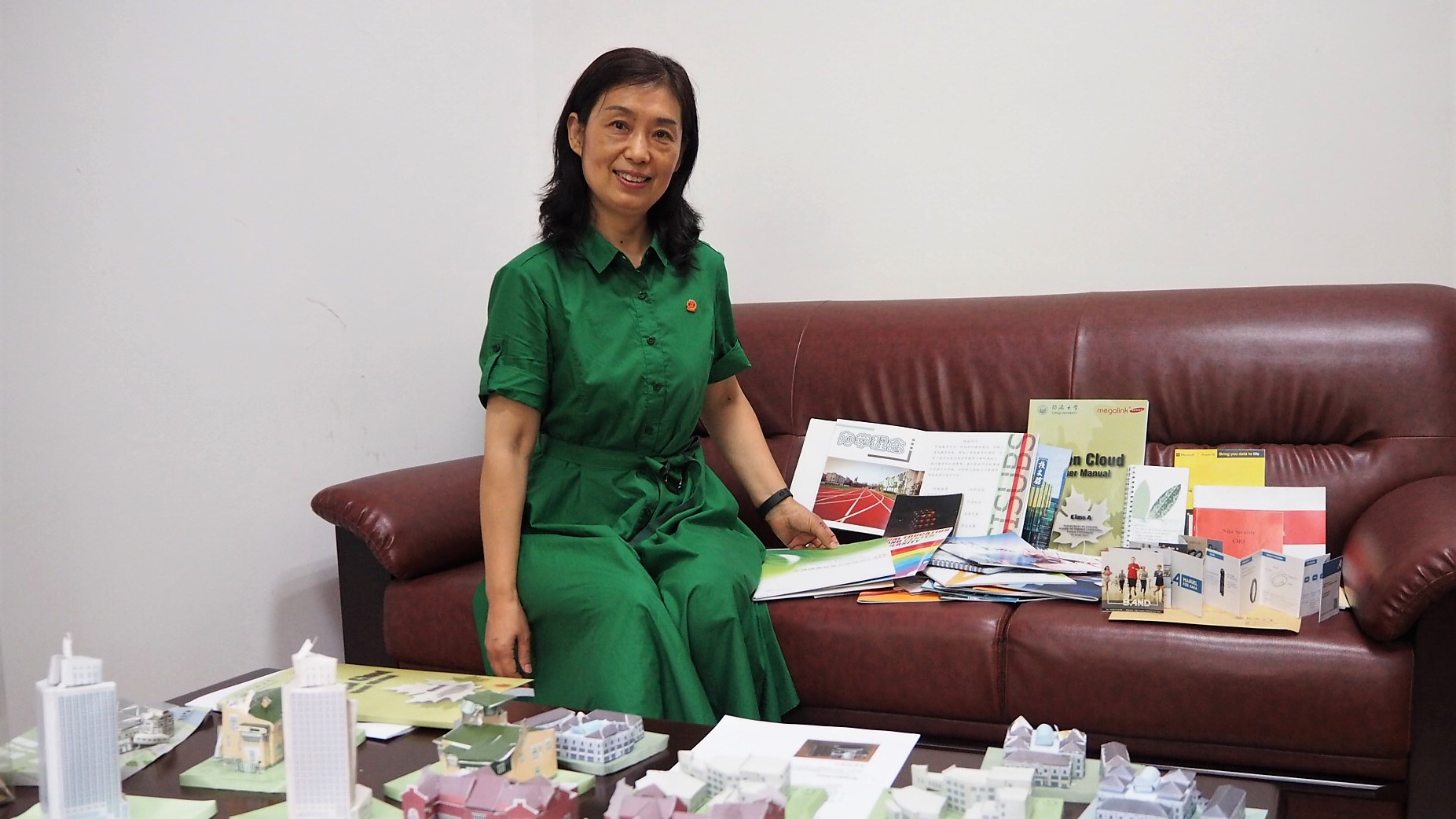Interview with Professor May LI, Tongji University: Industry Drives Technical Communication Development in China

Photo: Professor May LI, Tongji University
The number of technical communication jobs in Beijing and Shanghai doubled from 2012 to 2015. In Shenzhen, the number tripled, from 1000 to 3000, and in Hangzhou, the birthplace of Alibaba, it changed from 0 to 2000. Yet, there is only a handful of universities in China offering courses in Technical Communication in China. “There is a huge gap between market needs and workforce available. My dream is to establish a Technical Communication Degree program in China one day,” shares Professor May LI at Tongji University when we interviewed her last fall.
Professor May LI meets us in her office, where she proudly shows us the projects that her students have completed. She is holding the certificates – her students were volunteers at the tcworld conference in Shanghai, the biggest technical communication event in China arranged by tekom.
We ask Professor May LI about technical communication and its development in China.
Technical Communication is Rapidly Developing
Professor LI has taught Practical English Writing course for Tongji University English major students for many years. She started her course in technical communication for non-English majors in 2018 for the first time.
Professor LI shares with us that she heard the notion of technical communication about four years ago, when she met Nate Zhang, Country Manager at Sigma Technology China, at a conference in Nanjing:
“We were talking about technical communication and the shortage of experts in the area. While we were discussing it with Nate, I realized that what I did at my Practical English Writing course was very similar to technical communication. Starting from that moment we started collaborating together on introducing the course at Tongji.”
Professor LI has visited the tcworld conference in Shanghai three times. She was a listener for the first time, a presenter for the second time and an invited member of a panel discussion for the third time. Now, she has gathered a teaching team at Tongji working with technical communication.
Favorable Environment for Technical Communication in China
Professor LI believes that the time for technical communication is perfect in China. There is both the need from the market and the government. Over the course of the last couple of years, the amount of job vacancies for technical writers in China has doubled and in several cities even tripled.
The Chinese government’s Belt and Road Initiative contributes to the development of technical communication as well. As international investment and communications increase, more products enter the Chinese market. These new products need professional technical documentation in place.
Another contributor to the technical communication development is, of course, the governmental strategic plan Made in China 2025, which aims to promote China’s product development.
Three Challenges for Technical Communication
Professor LI sees three challenges for Technical Communication in China:
- Low awareness about technical communication
“The area is so new that many people simply don’t know what technical communication is. The problem gets bigger when decision-makers are not aware of technical communication. It stops investment and development.”
Read more information about the state of Technical Communication in China in our report.
- There is no Technical Communication Degree in China
“A handful of teachers offer a Technical Communication course. According to research, 79% of professional technical writers are self-taught who learn ‘by doing.’ There is a huge gap between the market need and education.”
- Industry support is vital for Technical Communication
It is almost impossible to teach technical communication at university without cooperation with the business.
“The field is very new, and we rely on the insights from the industry. Tongji and other universities attract industry leaders as supervisors for our TC courses. I know that Nate has been driving a technical communication course at Peking University as well. While other faculties benefit from cooperation with companies, for technical communication it is the only way to survive. That’s how we make sure that we prepare students who are ready for the market.”
Nate Zhang has been driving the development of technical communication in China for over nine years by now by offering training for both academia and business in the country.

Education with Practical Value
Professor LI has a comprehensive approach to her course.
“My aim is to not only give my students the theoretical value of the education but also introduce the practical approach. We start with learning how to do market research and competitive analysis of a product. This knowledge forms the core of future user manuals that my students will have to develop. We cover then the basic knowledge and specific tools for technical communication. When the students are done with their projects, we learn how to write CVs, cover letters, and pitch a product.”
Professor LI has introduced a new way of final examination at her course. Instead of a written exam, her students have to pass the interview with the jury that consists of teachers at Tongji and industry supervisors.
“We developed a ‘win-win’ approach with the companies: their supervising support gives value to my students and my course, while the companies get access to talents that are ready for the job market.”
Today, Professor LI has 20 supervisors for her course, the majority of whom come from international companies that have a presence in China, including Microsoft, HP, Lenovo, IBM, Sigma Technology, and others.
“My Dream is to have a Technical Communication Degree program in China”
Professor LI doesn’t hesitate long when we ask her about her future plans for technical communication development:
“My biggest goal is to establish a Technical Communication Degree program in China. Today, there are about 10 Chinese universities that offer courses in technical communication. 10 out of 3000. You see the problem!”
Last year, when we interviewed Professor LI, she started teaching her course to non-English majors, students studying medicine, architecture, electronics, and computer science. She regards it as a great potential for field development.
Shanghai Translation Technology Saloon is another way how Professor LI tries to develop technical communication community in China. The network now gathers over 500 members and arranges offline and online activities every other month.
“We focus a lot on English Technical Communication since there are many international companies who operate here and who know how important high-quality technical documentation is. I see an enormous need for technical communication in Chinese for local manufacturers. It is a great development potential.”
About Professor May LI
May LI, professor of linguistics with Tongji University, member of the Tongji University Council, vice chairman of Shanghai Science & Technology Translation Society, vice director of the Translation Technology Education & Research Society of WITTA (World Interpreter and Translator Training Association), founder of Shanghai Translation Technology Saloon and editor of Shanghai Journal of Translators.
Professor LI obtained her MA and Ph.D. degrees in linguistics from the University of Manchester, U.K. She used to work as editor of English programs with Anhui People’s Broadcasting Station, Anhui Province, China. She has been working at Tongji University, Shanghai, China since 1988.
The Chinese version of the article is available on WeChat.
For more information, please contact Nate Zhang, nate.zhang@sigmatechnology.com.
Share this article:

Sigma Technology
Sigma Technology Group, part of the Sigma Group, is a privately-owned global technology consulting company with operations in Sweden, Hungary, China, Norway, Germany and Ukraine and global delivery to Europe, the USA, and China. Sigma Technology Group offers cutting-edge expertise in software development, product information, embedded systems design & development, IT infrastructure development & administration, and digital solutions with expert consultants, offshore delivery, and development teams.
13 countries.






